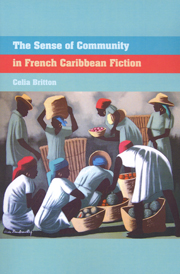Book contents
- Frontmatter
- Contents
- Acknowledgements
- Abbreviations
- Introduction
- 1 Restoring Lost Unity in Jacques Roumain's Gouverneurs de la rosée
- 2 Past, Future and the Maroon Community in Edouard Glissant's Le Quatrième Siècle
- 3 Living by Mistake: Individual and Community in Simone Schwarz-Bart's Pluie et vent sur Télumée Miracle
- 4 Singular Beings and Political Disorganization in Vincent Placoly's L'Eau-de-mort guildive
- 5 Conquering the Town: Stories and Myth in Patrick Chamoiseau's Texaco
- 6 Community, Nature and Solitude in Daniel Maximin's L'Ile et une nuit
- 7 On Not Belonging: Surrogate Families and Marginalized Communities in Maryse Condé's Desirada
- Conclusion
- Notes
- Bibliography
- Index
Introduction
- Frontmatter
- Contents
- Acknowledgements
- Abbreviations
- Introduction
- 1 Restoring Lost Unity in Jacques Roumain's Gouverneurs de la rosée
- 2 Past, Future and the Maroon Community in Edouard Glissant's Le Quatrième Siècle
- 3 Living by Mistake: Individual and Community in Simone Schwarz-Bart's Pluie et vent sur Télumée Miracle
- 4 Singular Beings and Political Disorganization in Vincent Placoly's L'Eau-de-mort guildive
- 5 Conquering the Town: Stories and Myth in Patrick Chamoiseau's Texaco
- 6 Community, Nature and Solitude in Daniel Maximin's L'Ile et une nuit
- 7 On Not Belonging: Surrogate Families and Marginalized Communities in Maryse Condé's Desirada
- Conclusion
- Notes
- Bibliography
- Index
Summary
The Caribbean's history of transportation, slavery and migration has created a situation in which the question of community becomes particularly urgent. The islands' societies are the pure product of colonization, which eliminated most of their indigenous inhabitants and transported millions of Africans to work on the plantations in conditions that obliterated most of their traditional social structures and practices. In these violently dislocated populations, there could be no ‘natural’ sense of community evolving peacefully over the years; rather, the problem of community, conceived both in terms of collective practices and institutions and on the subjective level of collective identity, generates a deep-seated anxiety in the French Caribbean. This book will examine representations of community in seven novels from the region: one from Haiti, three from Martinique and three from Guadeloupe. My project is to interrogate the sense of community expressed in these novels – in the double ‘sense’ of both a feeling of belonging to a community and the various meanings that the concept of community acquires.
The confrontations between colonizers and colonized have meant that race has been from the start a basic structuring principle of Caribbean society; black communities fought to assert themselves in the face of white racism, and therefore came to define themselves also along these lines. But the situation was complicated by two factors. In the first place, the economic and cultural dominance of the European colonial powers, and later also the United States, created a countervailing desire to become part of, rather than oppose, white society.
- Type
- Chapter
- Information
- The Sense of Community in French Caribbean Fiction , pp. 1 - 18Publisher: Liverpool University PressPrint publication year: 2010

